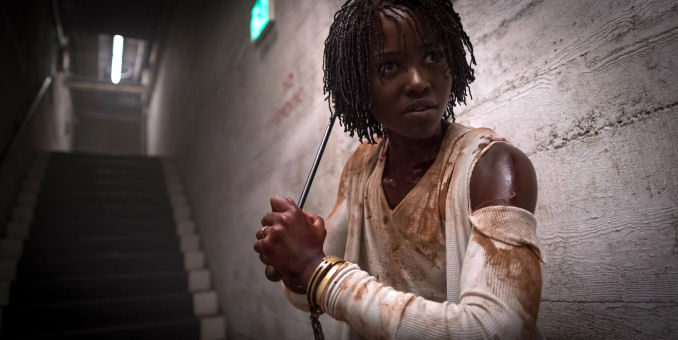 Note: There will be spoilers. Big ones.
Note: There will be spoilers. Big ones.
At first glance, Jordan Peele’s Us has the bones of a standard, home invasion horror film. An upper-middle class family has their somewhat isolated vacation home invaded by a quartet of red jumpsuited people who definitely mean them harm. But like in the movie itself, the true story that Peele is telling lurks under the surface, waiting for its own moment to rise up and strike out at the audience in a way that makes us rethink not only what we’ve seen in the preceding two hours, but how we look at our society around us.
Adelaide (Lupita Nyong’o) and Gabe (Winston Duke) are on a well-deserved family vacation to Santa Cruz with their two children, but Adelaide is not able to entirely relax. As a child on a similar trip, she received a scare in the boardwalk funhouse that still haunts her to this day. One evening, as the family is getting ready for bed, they notice four menacing figures standing silently at the top of their driveway. They descend on the house, quickly overpower the family and reveal themselves to as doppelgangers of Adelaide, Gabe and the children. Adelaide’s double Red tells them of a subterranean world, leftover from an experimental government attempt to control the population, where everyone’s double lives a forgotten life. And where they are rising up above ground to take what they feel should rightfully be theirs.
At first, I was not quite sure I bought into the whole explanation that the Tethered are the leftovers of a government experiment to control the above ground population. It seems a little too techno-babble and hand-wavey for my brain to engage with on a strictly storytelling level. But to just dismiss the film and what it has to say based on just that slight complaint would be a mistake.
What we need to do is look past the in-story nature of the Tethered to their deeper, allegorical purpose. These underground people are the forgotten people of society, analogs for the homeless and poverty-stricken. (It is hard not to type the phrase “forgotten people” without hearing a faint echo of “the forgotten man” from Gregory La Cava’s screwball comedy My Man Godfrey.) In this way, Us is a callback all the way to the fractured society scene in Fritz Lang’s Metropolis, with the Tethered stepping in for the doppleganger Maria robot infiltrating the high society world above them. It is perhaps no coincidence that the film’s title on posters is entirely capitalized, looking a bit like an abbreviation for United States, while in the film Red describes her family as “Americans.” And in that, Peele delivers his critique of and warning to our current state of late-period capitalism. It’s not quite “Eat the rich,” but it is “rise up and tear a chuck out of the rich’s throat.”
It is no small statement to say that if Peele is not already in the pantheon of great horror directors, it will be only a matter of time. He certainly is conversant with the genre and not afraid to sneak in some shout outs for fans to discover. Us is riddled with references from films as diverse as his obvious nods to CHUD and Jaws, but deeper, more subtle references to more auteur-ish films like Stanley Kubrick’s The Shining, Michael Haneke’s Funny Games and even Darren Aronofsky’s Black Swan. But this isn’t a Tarantino-esque remix of influences. (Not that there’s anything wrong with that.) In just two films, Peele has pretty much established himself and his storytelling voice as one unique to him while still speaking to universalities.
But Peele isn’t just about using horror as metaphor. He delivers on some good thrills and scares with Us. Some of these he builds slowly towards, feelings of dread growing as he toys at the primal fears of concern for family and children. Others are well crafted jump scares, a good old-fashioned dose of “Gotcha!” He also takes a few moments to subvert expected horror tropes, such as when Adelaide gets out of the car when the family should be fleeing to safety with all due haste.
This is just a few of the layers of this onion of a film that Peele has created. There is so much to discover, peel away and analyze such as Peele’s use of mirrors and reflective imagery or the parallels that exist between Adelaide and Dodson’s Alice In Wonderland. Also of interest is how Peel is extending his examination of themes of identity that he begun in Get Out. And there is plenty to be discussed about the titles of the VHS tapes we see on a shelf in the film’s opening shot as well as the film’s evocation of other 1980s pop culture ephemera such as Hands Across America. This is one film that is going to be the center of discussion for some time to come.





